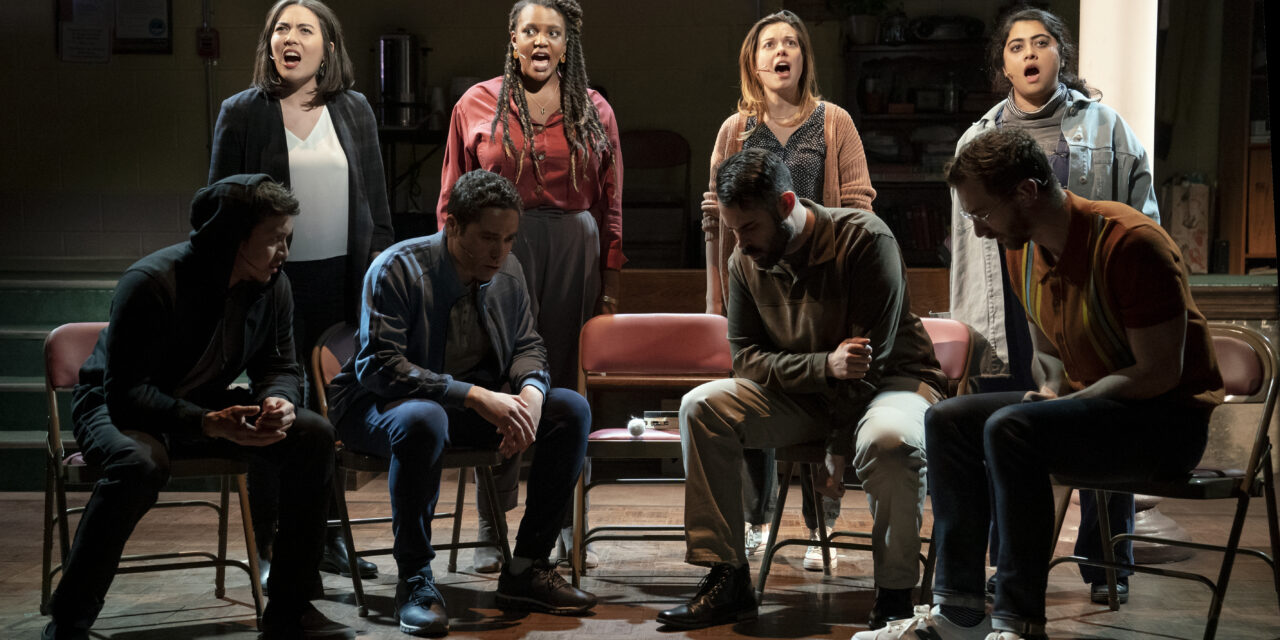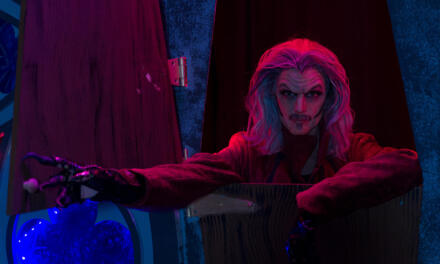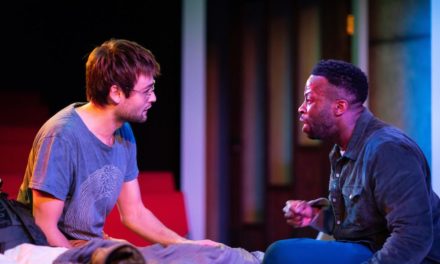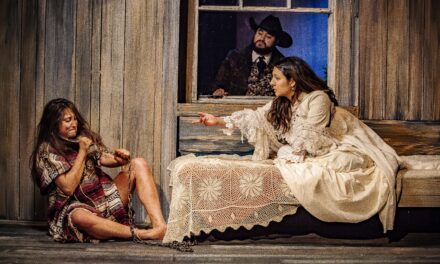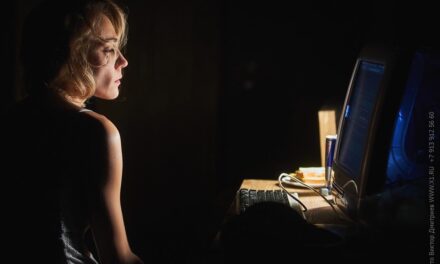Annie Tippe is currently directing the World Premiere of Dave Malloy’s Octet at the Signature Theatre Company, which happens to be a New York Times Critics Pick. She recently directed Ghost Quartet (also by Malloy), Cult of Love, and Continuity. Tippe studied and worked with Rachel Chavkin, who she considers an early mentor. She was a Drama League Fall Directing Fellow, as well as Ars Nova’s “Director-in-Residence” for 2016.
Tippe co-created the web series Basic Witch and is also developing I Heard Sex Noises into a short form series with Claire Rothrock, Ryann Weir, and Andrew Farmer. She has directed productions at a multitude of theaters including Soho Rep, IAMA, New Stages, HERE, and E. 4th Street Theater. She is also a performer and served as the associate director for Present Laughter on Broadway. She has also assisted directors Lila Neugebauer and Bob Balaban.
We recently talked to Tippe, now living in Los Angeles, about life in the theater, gender parity, her recent work on Octet, and her greatest challenge working as a theater director.
Octet closed on June 30th, 2019.
TT: What has your journey been like as a theater director, particularly as a woman?
AT: I feel like it’s not something I was ever thinking about in terms of gender, to be honest. All of my role models were women, and all of the people I worked with were women. I got out of school and started assisting Rachel Chavkin in a wide variety of ways. It wasn’t until I started touring with the show Ghost Quartet, that I started to feel like I was getting a different response because of my age. A lot of the crews I’m entering into {in L.A.} are almost entirely male, very unlike in New York where most of my collaborators are women. I’m suddenly finding myself in more male spaces.
For me, the conversation around gender in my career has been more about navigating my own sense of power and style. Some of it is dressing in a way that makes me feel more powerful and controlled, which is something I have had to let go of. I’m being louder and sterner, and I’m basically navigating what it’s like to be a woman and looking to my role models to figure out how women should be.
TT: Your mentor is Rachel Chavkin – she was your teacher first – and you’ve worked on several productions with her. Can you talk about that?
AT: Yes, I’ve co-directed two shows with her; I’ve been her assistant, and later her associate; I’ve acted with her – it runs the gamut.
TT: What was it like to see her win the Tony Award {for Hadestown}? How did you feel about the comments she made in her speech about inclusion in a theatre?
AT: I sobbed. It was meaningful on so many levels. It was meaningful on a personal level because I consider her my friend. It’s also incredible to see a leader being rewarded who truly believes in equity, fairness, and diversity in the workplace. She really believes in those things. She fights within our union, which I just joined. She’s an exemplary leader, and it makes me feel so much more confident about our business that these are the people we are trying to prop up. She looks very different from almost every winner of that award because they have all been men.
TT: What is your biggest challenge working as a theater director?
AT: Right now the biggest challenge is trying to figure out how to make this career more financially sustainable. That’s just on a practical level. As part of being in the union, I have access to more jobs. The pay for those jobs is more civil because it’s been determined by them, but I haven’t yet found a way to make the transition into directing as my sole career. I’m still working my day job and working any side hustles that come along. I’m grateful for those, but the biggest challenge is to figure out how to have it supported by the proper health and dental insurance.
I’m bummed that the biggest challenge is not a creative one; it’s just a practical one. Society is not necessarily geared toward the celebration of artists in the way that they are in other countries.
TT: It seems that a lot of playwrights are headed towards TV and film right now because those industries are more financially lucrative.
AT: There’s so much content being made and definitely TV and filmmakers are eyeing theater writers because they need the content. I’m definitely interested in directing television. I love the medium.
TT: How important is it for you to work on plays for, by, directed by, and starring women?
AT: It’s very important. I feel like the material I’ve developed with writers from the ground up, not necessarily the material I’ve been hired to direct, centers around women. I work with a musical team, Molly Beach Murphy and Jeanna Phillips, and all of our shows are about women. We have three we are currently working on, and they all involve women’s relationships to power and agency. They deal with women in a wide variety of economic classes, in very different parts of the country. It’s my dream to continue to just make art about women.
TT: Tell me about Octet and the inspiration behind the play.
AT: First and foremost, I adore Dave’s music. He’s one of my favorite composers, and I am so lucky to get to work with him.. His music is often boundary-breaking and really moving emotionally.
When he first brought me the piece, there was no music written. It was all the language. My way into a piece is usually through music, so it was interesting to wade through pretty dense text and visualize it emotionally. It {the play} goes into so many different worlds on the internet that I needed to come up with a physical way to lead the audience through a destiny that is the internet. It sounds so simple, but I started to think in shape. I knew the group would start in a circle because it’s about an addiction group. I knew there was a point in the play at which that circle would need to break which falls in line with the fracturing point of the show. Once the music got written and I could hear his music come to life, it came very naturally to me about how I wanted things to move.
TT: It’s the first musical at the Signature. Had you worked on a musical before?
AT: I’ve worked on quite a few pieces that fall into this genre of musical theater where it’s not quite a musical as you would recognize it but it is musical in nature. I did Dave’s “Ghost Quartet” and my writing team wrote a musical called “Cowboy Bob,” a musical about a female bank robber who robs banks for 20 years dressed like a man.
TT: What’s it like working with a cappella chamber choir and an original libretto inspired by internet comment boards, scientific debates, religious texts, and Sufi poetry?
AT: It’s heaven. I was in an a cappella group in college and I loved every second of it. It was my favorite part of the school. You get so close to the people you sing with. I understood that dynamic and knew the group bonding was necessary and the singers in the show are so remarkable. They’re great actors but they’re also selfless on stage. They support every singer they are singing with.
TT: The play has been so successful. How has that success felt?
AT: It’s really exciting. I’ve never done a show at a space as nice as the Signature, with so much support. It’s been wonderful reading the responses. I have to say the addiction to reading these online is very ironic since the show is about online addiction. I’ve been in the scary hole with that after doing a lot of research on the subject. It feels encouraging, like this is the right path I should be on. You have a lot of doubts when no one is seeing your work, or they are seeing your work and you can’t get the people who can produce it to see it. It’s just really exciting to see my work seen on this level, so it’s very encouraging.
TT: What’s next? It sounds like Octet is a real milestone in your career.
AT: I’m in the workshop phase with a lot of different projects right now. I was lucky enough to be hired to direct a play which will be next year. A lot of seasons book way out so it’s nerve-wracking like, “Hey, I’ve done Octet, will I ever work again?” I have to be proactive and work with artists who have like-minded sensibilities. It does feel like Octet is the start of something, and that has given me the confidence to know I can be working at this scope.
This post was written by the author in their personal capacity.The opinions expressed in this article are the author’s own and do not reflect the view of The Theatre Times, their staff or collaborators.
This post was written by Holly Rosen Fink.
The views expressed here belong to the author and do not necessarily reflect our views and opinions.

